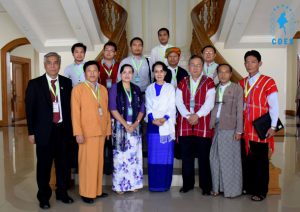“What do We Still Have Left to Offer?” – Questions of “Give” and “Take” in Build-up to Panglong Conference
By Burma Partnership • July 26, 2016 On 17 July, 2016, the State Counselor, Daw Aung San Suu Kyi met with the United Nationalities Federal Council (UNFC) to discuss a framework for the upcoming 21st Century Panglong Conference. Comprising of nine ethnic armed organizations (EAOs) that did not sign the nationwide ceasefire agreement (NCA), the UNFC promoted inclusivity as central to achieving the goal of a truly federal state. At the pre-conference meeting, the UNFC also highlighted the need for a unilateral ceasefire to be jointly announced between the Burma Army, the Government and EAOs.
On 17 July, 2016, the State Counselor, Daw Aung San Suu Kyi met with the United Nationalities Federal Council (UNFC) to discuss a framework for the upcoming 21st Century Panglong Conference. Comprising of nine ethnic armed organizations (EAOs) that did not sign the nationwide ceasefire agreement (NCA), the UNFC promoted inclusivity as central to achieving the goal of a truly federal state. At the pre-conference meeting, the UNFC also highlighted the need for a unilateral ceasefire to be jointly announced between the Burma Army, the Government and EAOs.
The general secretary of the UNFC, Khu Oo Reh, appeared displeased with comments made by Daw Aung San Suu Kyi during the meeting. Allegedly, the State Counselor asked ethnic groups to refrain from “demanding” during the upcoming peace conference, requesting instead that they consider what they can “offer.” In response, Khu Oo Reh stated, “Look at the states inhabited by the ethnic people. We have lost almost everything,” he said. “In this situation, what do they want from us? What do we still have left to offer?” he went on, “Go and look at the non-Bamar ethnic states. Mountains have turned flattened, flat lands (plains) become desert, river, stream and ponds dried. Our villages were being destroyed and our population have fled to jungles and mountains. Our mineral resources have been depleted and no trees and bamboos (forest) exist anymore. Now, what do you want more from us? What should we give more?”
This meeting precedes an EAO conference scheduled for July 26, in Mai Ya Jang, Kachin State, under Kachin Independence Organization’s administration. This summit, which will also include participation from ethnic political parties and women’s groups such as the Women’s League of Burma, a women umbrella group comprised of 13 women organizations with the aim to achieve gender equality and a democratic federal union in Burma, will similarly serve as a platform for formulating common interests ahead of the 21st Century Panglong Conference. A recently established agenda for Mai Ja Yang conference has stated that the conference will focus primarily on building a federal union, issues of national security, the political framework and the interpretation of the Panglong Conference itself. Meanwhile, a spokesperson for the Burma Army, Lt-General Mya Tun Oo, has expressed concern that the upcoming conference would give way to “greater territorial claims or forming of alliances,” and “Thus, if possible, [the Burma Army] does not want the Mai Ja Yang meeting to happen.”
The prospect of inclusivity and federalism at the 21st Century Panglong Conference may be undermined by the demands of the Burma Army. At a 13 May, 2016 press conference, the Burma Army reiterated its stance on the peace process, stating that it would not negotiate with the ethnic Kokang, Myanmar National Democratic Alliance Army, the Ta’ang National Liberation Army (TNLA) and the Arakan Army unless the three ethnic groups fully disarmed. This request is problematic, however, as the Burma Army itself continues to launch offensives and commit violence in ethnic areas throughout Burma. The Burma Army’s role in continued clashes – along with severe human rights violations – in Kachin, Shan and Arakan states is not likely to encourage EAOs to consider disarmament in the near future.
Recently, the Burma Army admitted involvement in the murder of five civilians in Mong Yaw, Lashio Township in June 2016. Though initially denying responsibility, the Burma Army suggested that their forces had incorrectly deemed the five individuals to be part of the TNLA, while further adding that they would investigate and prosecute the matter in their own military tribunal. Human rights groups, conversely, are expressing doubt at the military’s avoidance of responsibility for two additional deaths in the same village – those of Naw Tint and Sai Hla. An independent investigation from the Shan Human Rights Foundation places responsibility on the military for the deaths of these two civilians.
While the Burma Army’s partial admission of involvement in the Mong Yaw murders is largely unprecedented, the absence of total accountability is indicative of the pervasive culture of impunity. A recent report from the United Nations High Commissioner for Human Rights states, “Key to Myanmar’s transformation is the need to address ongoing and past human rights violations, which may otherwise undermine the transition.” The Mong Yaw murders present a rare opportunity for the Burma Government to demand a fully transparent and independent investigation of the Burma Army, held in a civilian court. Doing so will signal that the NLD-led Government has prioritized justice, likely encouraging greater participation from ethnic organizations in the upcoming 21st Century Panglong Conference who view the Burma Army as a longstanding and persistent threat to the establishment of a genuine federal union in Burma. Only by holding the Burma Army truly accountable can a sustainable peace be achieved.
Tags: 21st Century Panglong Conference, Burma Partnership, Kachin State, National League for Democracy, Nationwide Ceasefire Agreement, Ta'ang National Liberation Army, United Nationalities Federal CouncilThis post is in: Blog
Related PostsBurma Partnership Celebrates Continuing Regional Solidarity for Burma and Embraces the Work Ahead for Progressive Voice
U.S.: Lifting Sanctions on Myanmar Puts Human Rights Progress At Risk
United Nationalities Federal Council Statement
21st Century Panglong Conference Reaffirms Obstacles to Peace
The Elders welcome Myanmar peace conference









 All posts
All posts